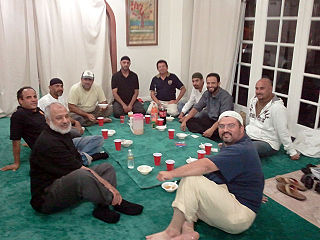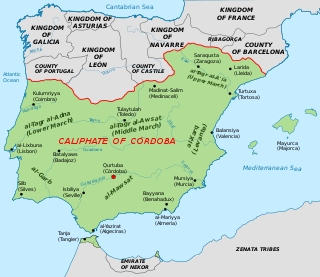
Ignacio Martín-Baró was a scholar, social psychologist, philosopher and Jesuit priest. He was one of the victims of the 1989 murders of Jesuits in El Salvador.

Guatemala is a predominantly Christian country, with Islam being a small minority religion. Due to secular nature of the Guatemala's constitution, Muslims are free to proselytize and build places of worship in the country.

Islam in the Dominican Republic is a minority religion. Accurate statistics of religious affiliation are difficult to calculate and there is a wide variation concerning the actual numerical amount. Although the majority of the population is Christian, Muslims have formed local organizations such as the Círculo Islámico de República Dominicana and the Islamic Center of the Dominican Republic. Currently, the Círculo Islámico estimates that Muslims number over 4,000, including of a good number of local converts. Most recently, there has been another organization, led by native born Muslim converts, the Entidad Islámica Dominicana or EID.

Mexico is a predominantly Christian country, with adherents of Islam representing a small minority. Due to the secular nature of the state established by Mexico's constitution, Muslims are free to proselytize and build places of worship in the country. The country has a population of around 126 million as of 2020 census and according to the Pew Research Center, the Muslim population was 60,000 in 1980, 111,000 in 2010, and is predicted to be 126,000 in 2030; however, according to the 2010 National Institute of Statistics and Geography (INEGI) census, there were only 2,500 individuals who identified Islam as their religion. Most Muslims are foreign nationals and the majority are Sunni.

Venezuela is a predominantly Christian country, with Islam being a minority religion. There are approximately 100,000 Muslims in Venezuela which make up 0.4 percent of the nation's population. Venezuela has a small but influential Muslim population. Many of them are Arabs of Lebanese, Palestinian, Syrian and Turkish descent.

Panama is a predominantly Christian country, with Islam being a minority religion. Due to the secular nature of Panama's constitution, Muslims are free to proselytize and build places of worship in the country.

Honduras is a predominantly Christian country, with Islam being a small minority religion. Due to secular nature of the country's constitution, Muslims are free to proselytize and build places of worship in the country. The statistics for Islam in Honduras estimate a total Muslim population of 11,000 representing 0.1 percent of the population.

Chile is a predominantly Christian country, with adherents of Islam being a minuscule minority. Due to the secular nature of Chile's constitution, Muslims are free to proselytize and build places of worship in the country. The statistics for Islam in Chile estimate a total Muslim population of approximately 5,000, representing less than 0.02% of the population. There are a number of Islamic organizations in Chile, including the Muslim Society of Chile and As-Salam Mosque in Santiago, Bilal Mosque in Iquique, the Mohammed VI Cultural Center in Coquimbo, and Islamic Foundation of Chile in Santiago.

Peru is a predominantly Christian country, with Muslims being a very small minority. Due to secular nature of the Peru's constitution, Muslims are free to proselytize and build places of worship in the country. The statistics for Islam in Peru estimate a total Muslim population of 15,000, largely based in the capital city Lima; this represents 0.015% out of total population of 32,555,000 inhabitants.

According to 2007 statistics released by the United States Department of State concerning Islam in Nicaragua, there are approximately 1,200 to 1,500 Muslims, mostly Sunnis who are resident aliens or naturalized citizens from Palestine, Libya, and Iran or natural-born Nicaraguan citizens born to both of the two groups. The Islamic Cultural Center in Managua serves as the primary salaat (prayer) center for Muslims in the city, with approximately 320 men attending on a regular basis. Muslims from Granada, Masaya, Leon, and Chinandega also travel to the Managua center for Friday prayers. Granada, Masaya, and Leon have smaller prayer centers in the homes of prominent local Muslims. In May 2007 the Sunni leader of the Managua prayer center was dismissed, due to the increase in Iranian influence in the Muslim community and was to be replaced by a Shi'a religious leader. By the end of the reporting period the Shi'a leader had not been identified.

Spain is a Christian majority country, with Islam being a minority religion, practised mostly by immigrants from Muslim majority countries, and their descendants. As of 2019, 4.45% of the Spanish population are Muslims.
There is a little Shia community in El Salvador. There is an Islamic Library operated by the Shia community, named Fatimah Az-Zahra. They published the first Islamic magazine in Central America: Revista Biblioteca Islámica. Additionally, they are credited with providing the first and only Islamic library dedicated to spreading Islamic culture in the country.

The Caliphate of Córdoba, also known as the Córdoban Caliphate, was an Arab Islamic state ruled by the Umayyad dynasty from 929 to 1031. Its territory comprised Iberia and parts of North Africa, with its capital in Córdoba. It succeeded the Emirate of Córdoba upon the self-proclamation of Umayyad emir Abd ar-Rahman III as caliph in January 929. The period was characterized by an expansion of trade and culture, and saw the construction of masterpieces of al-Andalus architecture.
The Islamic Federation of the Canary Islands is a Muslim religious organization that brings together associations and Islamic religious communities around the Canary Islands. Its headquarters is located in the town of Los Cristianos, in the municipality of Arona south of the island of Tenerife (Spain).

Arab immigration to the Republic of Honduras began in the 19th century with the liberal reforms of President Marco Aurelio Soto (1876–1883), who saw immigration as a determining factor in the development of capitalism in Central America, and sought to establish an attractive environment for foreign investment. The largest Arab community in Honduras is the people of Palestinian descent, the majority of whom (95%) are Christian. The approximate population of Honduran Arabs is more than 300,000 people, arround 280,000 Palestinians and 20,000 Lebanese, estimates place the Muslim population at about 11,000.
Abdul Karim Paz is an Argentine Shi'i sheikh, head imam of the At-Tauhid mosque in the Floresta neighbourhood. He is known for holding pro-Iran views on AMIA bombing case. Paz serves also as a representative of Organización Islámica Argentina.

Riay Tatary Bakry was a Syrian religious leader, chairman of the Union of Islamic Communities of Spain. He was imam of the Central Mosque in Madrid, Spain, as well as president of the Islamic Commission of Spain.
The Mosque of Lima, also known as the Mosque of Magdalena del Mar, is a mosque in Lima, Peru. It is one of two mosques in the country, the other being Bab al-Islam Mosque.











